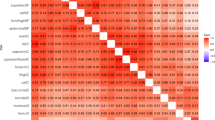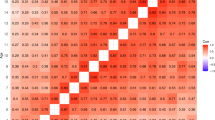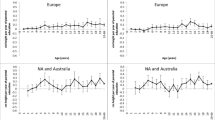Abstract
BACKGROUND: Adult body mass index (BMI weight (kg)/height2 (m2)) usually shows familial correlations below 0.3, which are almost entirely due to genetic influences. The considerable remaining non-familial individual variation may be due to non-shared environmental influences which, however, may interact with or modify the genetic influence.
OBJECTIVE: To investigate whether the genetic influence on adult BMI is modified by various obesity-related environmental conditions during childhood and adulthood.
DESIGN: Adoption study, in which the genetic influence is assessed by the correlations in adult BMI between adoptees and their biological fathers, mothers and full siblings. These correlations were compared between groups of families characterized by differences in rearing or adult environment of the adoptees and/or their biological relatives.
SUBJECTS: Height, current weight and greatest weight ever, were obtained in 3651 subjects, who were adopted by non-related families in Copenhagen between 1924 and 1947. Groups representing thin, medium weight, overweight and obese proband adoptees were selected by current BMI (n=540) and by maximum BMI (n=524). The members of the biological and adoptive families of the proband adoptees were identified and their BMI was computed from height and weight obtained by mailed questionnaires.
MAIN VARIABLES: Indicators related to the rearing environment of the adoptees were age of the adoptee at transfer to the adoptive family, region of residence, presence of adoptive siblings and, for the adoptive parents, year of birth, age at time of adoption, occupational rating, smoking habits and BMI. Indicators of the environment of both the adoptee and the biological relatives were: year of birth; occupational rating and smoking habits, and, of the environment of the biological parents, age and parity at birth of the adoptee.
RESULTS: The correlations in BMI between adoptees and the biological fathers, mothers and siblings were 0.11, 0.15 and 0.26 for adoptees selected by current BMI, and 0.13, 0.16, and 0.27 for adoptees selected by maximum BMI, respectively (all P<0.001), demonstrating the previously reported genetic influence. None of the environmental indicators showed consistent and significant effects on these six correlations. The same negative results were obtained in analysis of environmental indicators applied to the two adoptive parents together or to the adoptee and the biological relatives together.
CONCLUSION: The genetic influence on BMI was unaffected by several different environmental conditions otherwise associated with obesity.
This is a preview of subscription content, access via your institution
Access options
Subscribe to this journal
Receive 12 print issues and online access
$259.00 per year
only $21.58 per issue
Buy this article
- Purchase on Springer Link
- Instant access to full article PDF
Prices may be subject to local taxes which are calculated during checkout
Similar content being viewed by others

Author information
Authors and Affiliations
Corresponding author
Rights and permissions
About this article
Cite this article
Sørensen, T., Holst, C. & Stunkard, A. Adoption study of environmental modifications of the genetic influences on obesity. Int J Obes 22, 73–81 (1998). https://doi.org/10.1038/sj.ijo.0800548
Received:
Revised:
Accepted:
Published:
Issue Date:
DOI: https://doi.org/10.1038/sj.ijo.0800548
Keywords
This article is cited by
-
Leveraging community-based participatory research capacity to recruit Pacific Islanders into a genetics study
Journal of Community Genetics (2017)
-
Body size preference among Yoruba in three Nigerian communities
Eating and Weight Disorders - Studies on Anorexia, Bulimia and Obesity (2014)
-
Consideration of the canalisation effect based on physical factors of mothers and their children
Sport Sciences for Health (2009)
-
Association analysis of vitamin D-binding protein gene polymorphisms with variations of obesity-related traits in Caucasian nuclear families
International Journal of Obesity (2007)
-
Maternal Obesity Is Associated With Younger Age at Obesity Onset in U.S. Adolescent Offspring Followed Into Adulthood
Obesity (2007)


